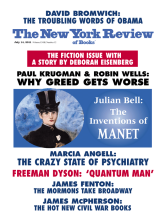In response to:
The Obedient Bellow from the April 28, 2011 issue
To the Editors:
I want to thank Professor Edward Mendelson for his thoroughgoing, generous, and perceptive review of Saul Bellow: Letters [NYR, April 28]. I must, however, disagree with the characterization of Bellow’s first surviving letter as an “anathema” against Yetta Barshevsky, his early sweetheart. Anathemas are pronounced by grown-ups; the boy who writes this letter is seventeen. Clearly, Yetta has turned her attentions to another, Nathan Goldstein (whom she will later marry). Rather than acknowledge a fait accompli, young Bellow pretends that it’s he who is breaking off. All of this is in the overheated idiom of teenage heartbreak (excessively brainy division). But isn’t it clear that the boy is enjoying himself? His letter is a piece of playacting.
Professor Mendelson goes on to claim that Bellow, still smarting sixty-six years later, wrote an “ambivalent eulogy” for Yetta Barshevsky Goldstein Shachtman (after divorcing Goldstein, she had married the Trotskyist Max Shachtman). That is not so, as anyone reading his extraordinary tribute must acknowledge. What follows is Bellow’s peroration, indicative of the whole:
I suppose I entered into Yetta’s enthusiasms for Yetta’s sake, for her importance to me was very great. She was one of those persons who draw you into their lives and also install themselves in yours. Even the small genetic accident that made one of her eyes seem oddly placed added warmth and sadness to her look. She always seemed to me to have a significant sort of Jewish beauty…. There is something radically mysterious in the specificity of another human being which everybody somehow responds to. Love is not a bad word for this response. Today’s memorial testifies to Yetta’s secret power, the power of being Yetta.
There, six and a half decades later, is the real heartbreak, without playacting—and certainly without ambivalence.
About my editorial decisions, Professor Mendelson is right on every count:
1) I saw no need to indicate twice that Bellow was cuckolded in the late Fifties by his colleague and friend Jack Ludwig.
2) I only identified PM as a publication, omitting its editorial convictions.
3) I did not show how individual letters are signed—unless not signed “Saul” or “Saul Bellow,” in which case I believe I have consistently indicated the signature (e.g., “Papa” or “Bellow the Rocket” or “S.B. Pamunyitzoff” or “Taras Bulba” or what have you).
4) My annotations have left certain “large questions” unanswered; interpretation of Saul Bellow’s life must wait on the skills of his next biographer; my notes—329 in all—contain only facts or inescapable inferences, and only those I have judged necessary. By decree of Viking, Letters could be no longer than 550 pages. In the interest of including more letters, I therefore limited commentary where I reasonably could.
Professor Mendelson genially mentions the Facsimile Curse, and I gather that not having escaped it puts me in distinguished company. In any case, the discrepancies he observes between frontispiece and transcription will be corrected in a paperback edition of the book due next March from Penguin.
Again, with real gratitude, I thank Edward Mendelson for his valuable insights.
Benjamin Taylor
New York City
Edward Mendelson replies:
Saul Bellow’s ambivalence toward Yetta Barshevsky—because of her politics—is so obvious that I am at a loss to imagine why Mr. Taylor should wish to deny it. Readers who consult pp. 527–529 of the Letters will admire the skill with which Bellow was able to express mixed feelings even in a memorial tribute. On every other point, I am grateful to Mr. Taylor for his good words.



